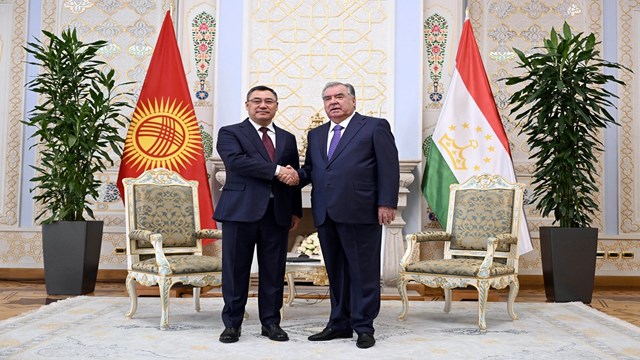
Relations Between Kyrgyzstan and Tajikistan Improve Following Border Agreement
Relations Between Kyrgyzstan and Tajikistan Improve Following Border Agreement
Following the signing of the border agreement between Kyrgyzstan and Tajikistan, relations between the two countries continue to progress.
According to a statement from the Kyrgyz Presidential Press Office, President Sadyr Japarov paid a return visit to Dushanbe, the capital of Tajikistan, upon the invitation of Tajik President Emomali Rahmon.
Japarov was welcomed by Rahmon at Dushanbe International Airport. The two leaders attended a concert featuring more than 500 performers.
Later, during the official ceremony held at the Presidential Palace of Tajikistan (Palace of the Nation), 21 gun salutes were fired in honor of President Japarov’s visit.
Leaders Discussed Security and Border Demarcation
In a private meeting, the leaders discussed a wide range of bilateral cooperation topics, including the situation of citizens living in the border regions of both countries.
President Rahmon noted that Kyrgyz-Tajik relations are on the rise, highlighting that the border demarcation process had been successfully completed and that efforts in this area are actively continuing.
Rahmon emphasized the dynamic development of trade, economic, cultural, and humanitarian ties between the two countries and underlined the importance of close cooperation in the field of security.
He stated that he was ready to discuss with his Kyrgyz counterpart the current state and future prospects of bilateral partnership, as well as regional and international issues.
Japarov Expects Constructive Talks
President Japarov expressed gratitude for the invitation and for the warm and sincere reception from the brotherly people of Tajikistan.
He stated that he expects constructive negotiations during the talks and noted that the completion of the border demarcation process is a significant step not only for the two countries but also for strengthening security and stability throughout the region.
Japarov affirmed his confidence that the border delimitation work would be completed in the near future according to the agreed timeline.
A Series of Documents and Agreements Signed Between the Two Countries
After the inter-delegation meeting, the leaders signed a joint declaration.
Additionally, several agreements were signed between Kyrgyzstan and Tajikistan, including an agreement on confidence-building measures, the establishment of the Kyrgyz-Tajik Intergovernmental Council, and cooperation agreements in the fields of geodesy, cartography, land management, cadastre, real estate registration, and remote sensing.
Other agreements signed included cooperation in standardization, metrology, product conformity assessment and accreditation, as well as in tourism. An agreement was also approved to establish a business council between the two countries’ Chambers of Commerce and Industry.
Agreements on cooperation between labor, social security, and migration institutions, as well as on public service and a cooperation program between the Ministries of Foreign Affairs, were also signed.
An action plan covering the 2025–2026 period for cooperation in supply, industry, and new technologies was endorsed. Furthermore, cooperation agreements on environmental protection and sustainable development, as well as memorandums of understanding between national broadcasting organizations and agricultural research institutes, were signed.
Following the signing ceremony, the border customs checkpoints “Karamyk” and “Bordobo” between the two countries were officially opened via video conference.
Leaders Spoke to the Press After Talks
Speaking to the press after the talks, Japarov stated, “Today, Kyrgyz-Tajik relations are entering a new phase of development based on mutual respect, trust, and good neighborliness.”
He announced that they had agreed to facilitate border crossing procedures for citizens, including creating favorable conditions for trade and the movement of goods and services, and that the first meeting of the Kyrgyz-Tajik Intergovernmental Council would be held in Bishkek.
Rahmon emphasized that they had agreed to continue cooperation in the field of hydroelectric energy and stated that the agreements signed today had strengthened the legal foundation for further expanding the full spectrum of trade, economic, cultural, and humanitarian relations.
Border Agreement Signed on March 13 in Bishkek
The long-standing border dispute between Kyrgyzstan and Tajikistan, which had continued since 1991, was resolved with the signing of an agreement by the presidents of both countries on March 13 in Bishkek.
The exchange of the border agreement documents took place in the city of Khujand, Tajikistan, on March 31.
As a result, the disputed 486-kilometer section of the 1,006-kilometer-long border between Kyrgyzstan and Tajikistan was officially defined.